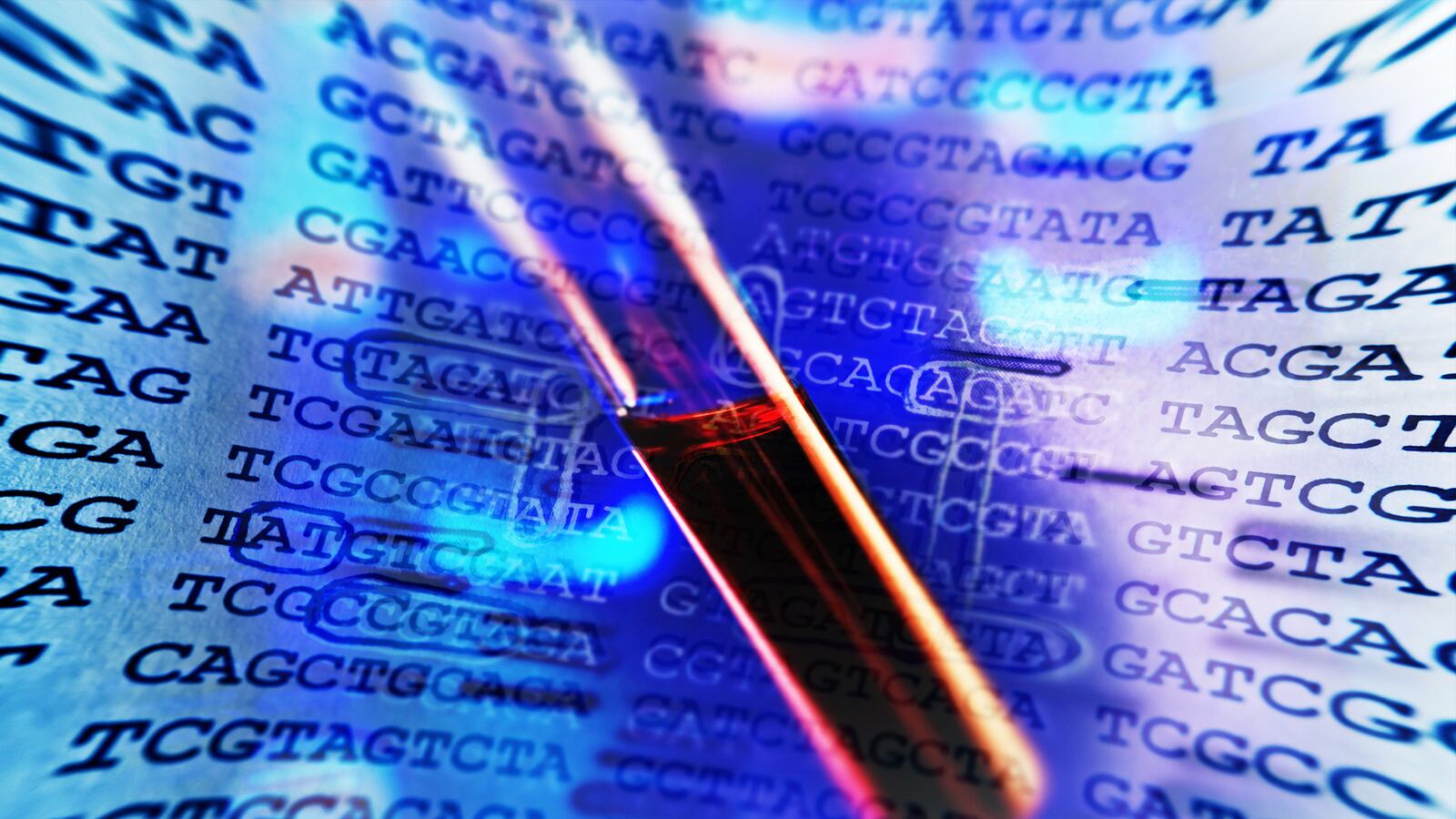Every year, twice as many people kill themselves than are murdered in the United States. A contributing factor to the annual suicide death rate of more than 40,000 is that even trained professionals have difficulty figuring out when people have reached a crisis level grave enough to end their lives. But researchers at the University of Indiana say they’ve made a breakthrough toward better suicide prevention.
In a paper published in Molecular Psychiatry in August, scientists say they’ve discovered biomarkers in the blood that, when combined with results of a mental health questionnaire, can predict with 92 percent accuracy whether someone has high suicide risk, or ideation (having thoughts about how to kill yourself).
Used alone, the blood test was able to identify suicide ideation by 72 percent, while the questionnaire on its own was accurate 85 percent of the time, the co-authors say.
“A decade ago, there was a lack of objective biomarkers for mental illness,” says Alexander Niculescu III, MD, Ph.D., professor of psychiatry at the University of Indiana, director of the Laboratory of Neurophenomics, and senior author of the study. “But over the last 10 years, we’ve been trying to find molecular changes, or different genetic fingerprints, that indicate mental illnesses.”
Previous research in this area exists, Niculescu says, but this study, which evaluated 217 male participants already being treated at VA hospitals for mental health disorders, is the most comprehensive to date.
In addition to building upon past research of mental health biomarkers, Niculescu continues, “We were able to identify a series of powerful new biomarkers and describe how they can be used in conjunction with apps that identify people at high risk for suicide, and how that can be used as a predictive tool for early intervention to prevent such tragedies.”
The American Foundation for Suicide Prevention’s vice president of research, Jill Harkavy-Friedman, Ph.D., said the study is a great start.
“They went on the premise of what we know: Brains are different in people who kill themselves,” she says. “One difference in genes that has been demonstrated across several studies relates to stress genes. We’ve learned they function differently in people who die by suicide.”
Finding biomarkers for mental illnesses has been a Holy Grail researchers in psychiatry have sought for decades. We have tests that assess risk for physical illnesses such as heart disease and high cholesterol, so why shouldn’t we work toward finding tangible, objective indicators for mental illness as well?
A biological signal to doctors that a person someday might develop schizophrenia or bipolar disorder, even if he or she isn’t yet presenting symptoms, would help them develop a preventive plan before the onset of the disease. Early intervention is easier than treating an illness once it presents itself, doctors say, and identifying biomarkers would also help them decide which drugs might be the most effective treatment for the patient.
“The hope arose because biomarkers have been used successfully for other medical illnesses,” says Dr. Lakshmi N. Yatham, MBBS, FRCPC, MRCPsych, professor of psychiatry at the University of British Columbia. “For example, in breast cancer treatment, people with a certain genotype respond to treatment with a drug called Tamoxifen, but others don’t.”
Although this study focused only on determining suicide risk, having more diagnosis-specific biomarkers that could predict future mental illness is the goal, Niculescu says. One obstacle muddying the waters at present is that the same sets of biomarkers are seen among people with different types of disorders; this test doesn’t differentiate between depression, schizophrenia, or bipolar disorder, for example. But he seems confident that within five years, biomarker tests such as these will be used in clinical settings.
Even as recently as two years ago, however, some experts dismissed the mental illness biomarker search as fruitless, in part because psychiatric disorders are so complex. And some say that the idea that this relatively small study opens the door to biomarkers playing a significant role in clinical diagnoses in the near future is wishful thinking.
“This is obviously a well-conducted and potentially important study, and I can absolutely see how genetics or variable biochemical abnormality can change your thinking styles and can make you suicidal,” says Peter Kinderman, MA, Ph.D., professor of clinical psychology at the Institute of Psychology Health and Society of the University of Liverpool.
“But as well as being skeptical of the logic, which I am, I’m skeptical of the predictive power described in this paper. We already knew that if you simply ask people if they’re feeling suicidal, you can rely on what they say in eight out of 10 cases. Adding a blood test, the number may go up to nine out of 10, if you believe this paper. Which is not a striking breakthrough in a practical sense,” he says.
The test can be used in acute settings, such as emergency rooms, Niculescu says, but would be more useful in routine screenings: “It’s more valuable to screen people early on before they have acute symptoms to see who’s at risk, and the earlier you identify problems the easier it is to intervene. If you know the risk early on you can change their lifestyle, reduce levels of stress, [or] try a medication.”
Such usage is realistically far off, Kinderman says, pointing out that identifying the same markers in suicidal people is not the same as finding the cause of suicidal thoughts.
“There’s a profound difference between seeing whether we can find an abnormality in some people’s brains and understanding how the brain works. So we’re quite far away from being able to test normal people and ID people who might have problems,” he says. “We’re a million miles away from that.”
Some of the skepticism is because our understanding of gene expression (the process in which genes, such as antidepressant genes present in our bodies, turn themselves on or off) is in its infancy. So drawing conclusions and making recommendations based on the presence of biomarkers is premature.
“As we find genes for breast cancer, some people who have this gene are getting mastectomies, but that might or might not be recommended, depending on the presence of other risk factors because there’s going to be more than one gene causing breast cancer,” Harkavy-Friedman points out. “Just because you have a gene for something doesn’t mean you’re going to get it, and it doesn’t mean you have to treat it like you have it already.”
Although it’s a cutting-edge area of research, controversy regarding biomarkers in psychiatry essentially boils down to the age-old “nature vs. nurture” question. Kinderman expresses frustration that putting so much emphasis on finding biological indicators ignores what we already know about the causes of mental illness, which in addition to biology include a history of abuse, environment, drug and alcohol use, and even diet.
“If you found a blood test for suicidal behavior that bypassed the psychological aspects, that would be odd,” Kinderman says. “Not impossible, and interesting, but it would profoundly change our understanding of what the brain does, and in a sense make human beings into automata—so that biology influences behavior, with the psychological factors being bypassed or redundant. That would have profound implications for how we understand emotions and thought processes.”
Vaguely Orwellian fears might be unfounded, however. Niculescu says that biomarker tests can and should be just part of a holistic and individualized treatment program.
“If people without prior illness would take these tests, the results would need to be treated with the same caution as when genetic testing implies that someone has predisposition to a physical illness, be it prostate cancer or Alzheimer’s disease,” says Eva E Redei, MS, Ph.D., professor of psychiatry and behavioral sciences at the Asher Center for the Study and Treatment of Depressive Disorders in the Feinberg School of Medicine at Northwestern University.
But if you know that you’re at risk for something, you can monitor it more closely, Harkavy-Friedman says.
An even broader issue is how little we know about how to treat mental illness when we know it’s there. Despite all we know about suicide prevention, for example, the number of people who kill themselves in this country is going up slightly, not down.
So what good does predicting suicidal thoughts do if we can’t even prevent people we know to be suicidal from killing themselves?
On a Friday night just over four years ago, Rachel Collins, a 37-year-old psychiatric nurse from Rhode Island, drove to the Cape, left her phone and purse in the car and walked into the water at Nauset Light Beach in Eastham, Massachusetts. Boaters found her body the following Wednesday. She was “distraught” and had a history of depression, according to local news reports, and her family assumed it was suicide even before an autopsy was completed.
Her death was shocking and upsetting to friends and family, but not particularly surprising. Collins had attempted suicide before and had battled mental illness—depression and possibly bipolar disorder—most of her adult life. The ever-changing cocktail of antidepressants, anti-seizure medications, and electroshock treatments she was prescribed seemed only to worsen her mental health.
“Not that she didn’t make mistakes, but the years and effects of the mixes of medications she was on turned her from a vibrant, intelligent smart-ass to someone who was numb, couldn’t remember things, and [was] living as a shell of her former self,” says friend Kelly Chadwick.
A month before her death, Collins attended Chadwick’s 40th birthday party.
“There were a lot of people there whom she hadn’t seen in ages,” Chadwick says. “She didn’t remember people or stories, and stared blankly and didn’t blink. She literally held onto a chair the whole time she was here. A few of us tried to talk to her after the party but never heard back from her.”
Although this new research might not be as groundbreaking as many would like to believe, it is a step toward a better understanding of mental illness. And one thing everyone agrees upon is that more research is needed to prevent tragic and preventable suicides.
“The biological link may well be true, but beyond the hype, [this study] doesn’t explain very much,” Kinderman says. “And even if it’s true, it’s kind of missing the point. It’s only addressing a small amount of the variance. Biology is a small part of what should be our response to mental health problems, so it’s frustrating that the discussion keeps coming back to ‘We’ve found the holy grail.’ This study only points out how human beings are different and interesting, not how to improve how we help them.”




